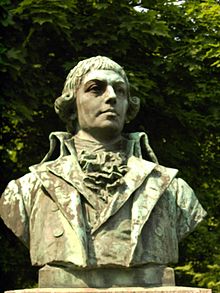Lenore (ballad)
Lenore, sometimes translated as Leonora, Leonore, or Ellenore, is a poem written by German author Gottfried August Bürger in 1773, and published in 1774 in the Göttinger Musenalmanach.
The idioms of every language are the impressions of its country, its nationality, its history.After reading Reliques of Ancient English Poetry by Thomas Percy and James Macpherson's Ossianic poems, Herder thought the means through which Germany could create a unique literature of its own would be to collect folk songs among the lower classes of Germany:[4] It will remain eternally true that if we have no Volk, we shall have no public, no nationality, no literature of our own which shall live and work in us.
Unless our literature is founded on our Volk, we shall write eternally for closet sages and disgusting critics out of whose mouths and stomachs we shall get back what we have given.Bürger answered Herder's plea by publishing Lenore, which had been suggested to him by a Low German Volkslied that (according to his biographer, Althof) he heard a peasant girl singing one night, but could only remember a small portion of: The moon it shines so bright— The dead ride quick by night.
When the other warriors return from the war without William, she begins to quarrel with God, complaining about His unfairness and proclaiming that He has never done her any good, which prompts her mother to ask for her daughter's forgiveness because she knows that such a thought is blasphemous and will condemn her to Hell.
Lenore happily gets on the stranger's black steed and the two ride at a frenetic pace, under the moonlight, along a path filled with eerie landscapes.
However, Lenore, punished with death, still has hope for forgiveness (des Leibes bist du ledig / Gott sei der Seele gnädig).
[11] According to German language scholar John George Robertson,[8] [Lenore] exerted a more widespread influence than perhaps any other short poem in the literature of the world.
The eerie tramp of the ghostly horse which carries Lenore to her doom re-echoed in every literature, and to many a young sensitive soul was the revelation of a new world of poetry.
[...] In short, Bürger’s achievement, while minor in itself, helped father an international movement that led directly to the massive popularity of Gothic works then and now.
[...] As the Gothic novel borrowed many of its original conventions from the German ballads, as popularized by "Lenore," we can fairly say that Bürger is one of the most influential founding fathers of the Gothic and horror genres.Lenore was an immediate sensation in Germany and was widely translated into different languages, which brought it a great deal of popularity in many European countries and the United States, and also generated numerous "imitations, parodies, [and] adaptations".
[14] After Walter Scott heard how enthusiastically a crowd at Dugald Stewart's house had reacted to a reading of Taylor's version done by Anna Laetitia Barbauld, he attempted to acquire a manuscript of Bürger's original.
[19] Influences of Bürger's poem on "Monk" Lewis, John Keats and William Wordsworth have also been noted,[9] and some of its verses have been used by other authors on their own works.
The verse die Todten Reiten schnell ("The dead travel fast") is also particularly famous for being cited by Bram Stoker in the first chapter of his novel Dracula (1897).
[32] Lenore has also inspired several illustrations by a large number of notable artists, including Carl Oesterley, Daniel Chodowiecki, Ary Scheffer, Horace Vernet, Johann Christian Ruhl, Hermann Plüddemann, Johann Heinrich Ramberg, Louis Boulanger, Otto Schubert, Eugen Napoleon Neureuther, Karl Friedrich Lessing, Frank Kirchbach, Georg Emanuel Opiz, William Blake, Franz Stassen, Franz Kolbrand, Octave Penguilly L'Haridon, Wilhelm Emelé, Alfred Elmore and Frank Stone.
[33] Lady Diana Beauclerk's depictions of the ballad were published in William Robert Spencer's rendering, while Daniel Maclise and Moritz Retzsch illustrated Julia Margaret Cameron and Frederic Shoberl's translations, respectively.

